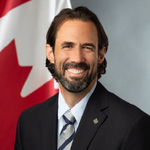Cultural Industries and Soft-Power Diplomacy: Canada’s Experience
On Tuesday 18 July 2023, André François Giroux, Consul General of Canada in Sydney, and Jerome de Baecque, Director of APAC for Moment Factory, addressed the Institute on the intersection between culture and diplomacy, drawing on Canada’s experience in Australia and the Asia-Pacific.
André opened with a comment on the connective function of diplomacy. Countries, he emphasised, have interests, not friends. Such interests are best-served by a dynamic diplomatic vision that harnesses technology, people and imagination to build connections, trust and respect between nations. Canada’s ‘Future of Diplomacy’ initiative, launched in May 2022, positions people-to-people connection at the heart of its Indo-Pacific strategy. As the lifeblood of a vibrant society, culture is key to building the sorts of connections prioritised in this strategy. Canada’s careful use of culture in its soft-power diplomacy has allowed it to build influence in the Indo-Pacific region whilst also pursuing enhanced regional security and prosperity. André neatly summarised the value of this strategy, suggesting that front-stage cultural performance opens doors for successful backstage diplomacy.
Describing the Canada-Australia relationship, André observed that the two nations are alike in many ways. Though separated by vast stretches of ocean, they both lay claim to large territories and have a rich indigenous heritage, a strong multicultural present, and close ties within the Commonwealth. Both countries stand to benefit from working together, despite occasionally being in competition as middle powers. Bound by culture, shared values and comparable experience, Australia and Canada have a mutual interest to work together for the good of the Indo-Pacific region, especially in defence of a safe, secure and peaceful rules-based order.
Drawing on his own consular experience, André explained that Canada’s cultural diplomacy team works hand-in-hand with the trade and creative industries team to strengthen connections with Australia, promote mutual business interests and develop influence in trade. Canada’s cultural exports to Australia, notably in festivals like World Pride and the Sydney Film Festival, offer Canada a wonderful opportunity to engage and bring people together while enhancing Canada and Australia’s mutual partnership.
For Jerome, the trust between Australia and Canada represents a tremendous opportunity for the creative industries of both countries. The success of Moment Factory’s ‘Resonate’ and ‘Mirror Mirror’ installations at Illuminate Adelaide stemmed from a close and meaningful collaboration between Australian and Canadian creators. The cultural fit, he remarked, was almost instant due to shared audience demographics, a skilled talent pool and similar ways of working. Comparing this to projects undertaken by Moment Factory elsewhere in the Asia-Pacific, Jerome suggested that successful international partnerships in the creative space are predicated on trust, respect and cultural alignment.
Asked about the power of cultural diplomacy in place-making and community-building, Jerome affirmed that international collaboration in the creative industries equips local groups with the tools they need to express their stories on the global stage. André added that artists can be powerful communicators of values. When those values align with the strategic foreign policy of a given nation, culture opens space for productive dialogue between countries.
On the question of successful cooperation beyond the Anglophone sphere, both speakers emphasised the importance of cultural exchange in fostering communication and mutual understanding. One attendee suggested that Canada benefitted from its official status as a bilingual country, allowing it to engage with both the Anglophone and the Francophone spheres. While André acknowledged that using two widely-spoken languages was advantageous in diplomatic affairs, Jerome argued that Australia’s unofficial multilingualism counts in its favour with the international community.
Responding to questions about indigenous self-determination, André acknowledged that it was a complex and multilayered issue, but that representation and the recognition by Canada’s courts of indigenous treaties – oral as well as written – over the past 100 years had been crucial in promoting reconciliation and indigenous advancement. In modern times, land claims settlements had consolidated the constitutional standing of indigenous Canadians.
Other questions raised the possible opportunities for Australian artists and performers in Canada and the near-disappearance of the Quebec independence movement. The talk concluded with a question on cultural competition and cooperation with the United States. Asked about the secret of Canada’s success in showing more independence than Australia from US foreign policy (for example, during the Vietnam War), André wryly replied that Canada’s geographic location meant its security umbrella was assured.
Report by Imogen Biggins, AIIA NSW Intern

André Giroux

Jerome de Baecque